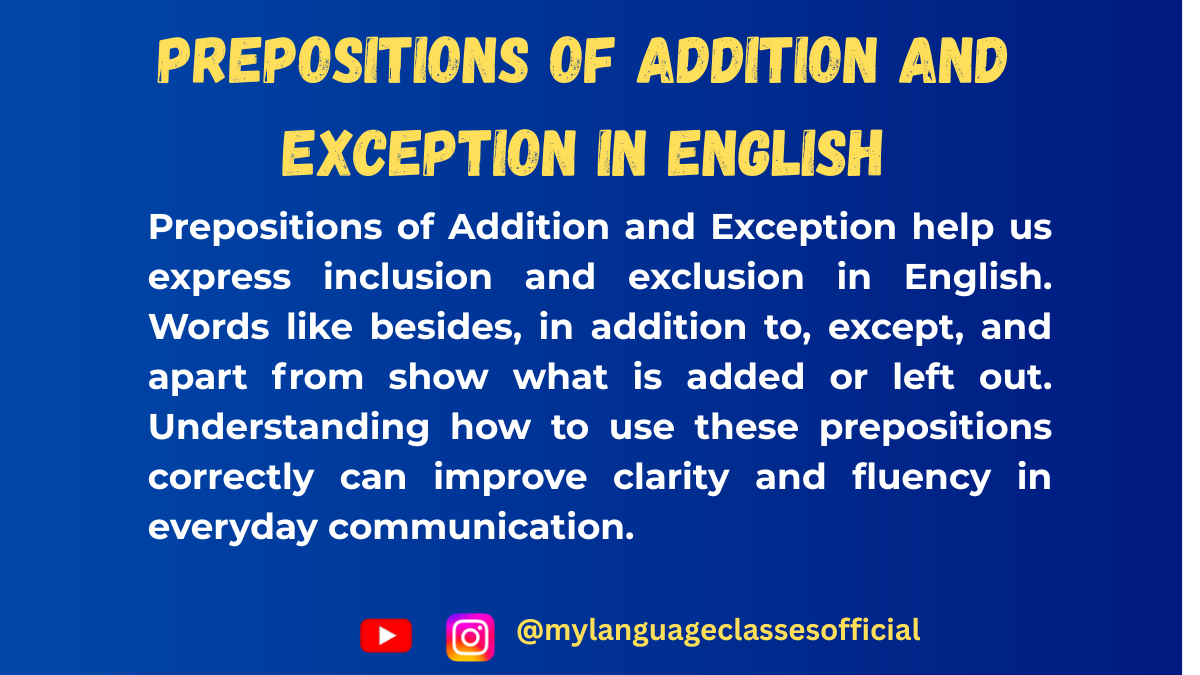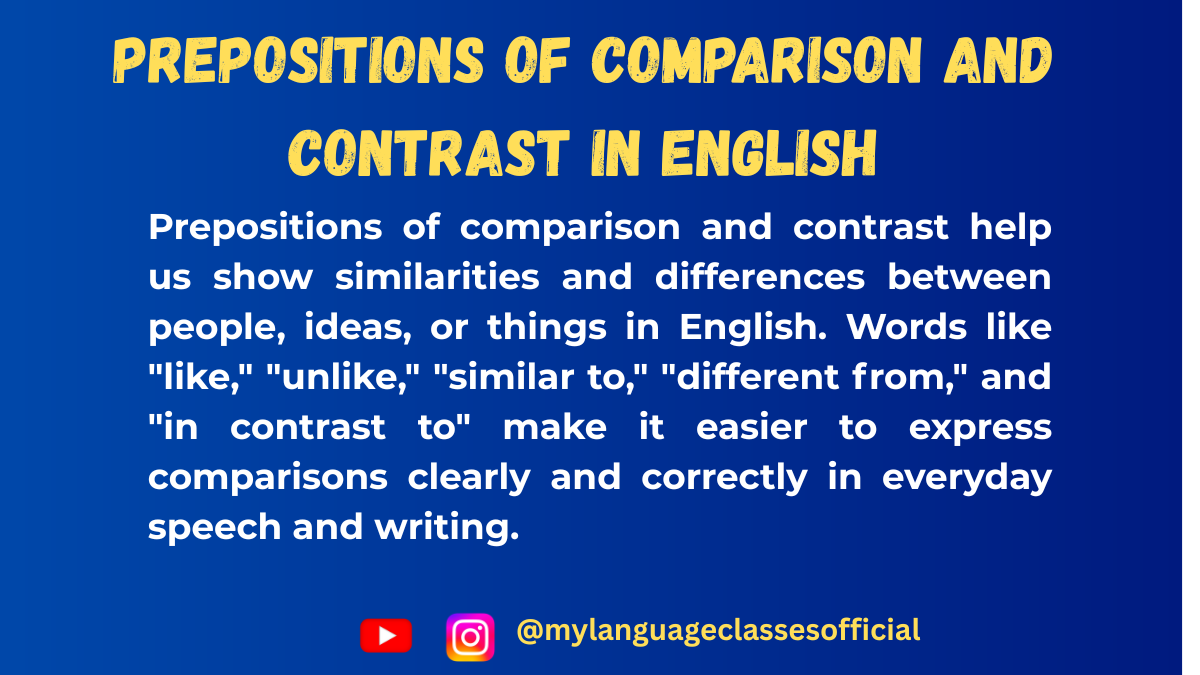Your cart is currently empty!
Tag: advanced English prepositions
-

Prepositions of Addition and Exception in English
Prepositions are small but mighty words that play a crucial role in the English language. They help us express relationships between different elements in a sentence. Among the various types of prepositions, Prepositions of Addition and Prepositions of Exception are particularly important. These prepositions help us add information or exclude certain elements in a sentence. In this blog post, we’ll explore their usage, provide examples, and offer tips to master them.
What Are Prepositions of Addition and Exception?
Prepositions of Addition
These prepositions are used to add information or include something in a sentence. They indicate that something is being added to what has already been mentioned. Common prepositions of addition include besides, in addition to, and along with.
Prepositions of Exception
These prepositions are used to exclude something or indicate an exception. They show that something is not included in the statement. Common prepositions of exception include except, except for, apart from, and but.
Usage of Prepositions of Addition and Exception
1. Prepositions of Addition
- Besides: Adds information or includes something extra.
- Example: Besides English, she speaks French fluently.
- In addition to: Adds something to what has already been mentioned.
- Example: In addition to the main course, we ordered dessert.
- Along with: Indicates inclusion or accompaniment.
- Example: He came along with his friends to the party.
2. Prepositions of Exception
- Except: Excludes something from a general statement.
- Example: Everyone attended the meeting except John.
- Except for: Excludes something with a focus on a specific detail.
- Example: The room was empty except for a single chair.
- Apart from: Excludes something while implying everything else is included.
- Example: Apart from the weather, the trip was perfect.
- But: Excludes something in a more informal context.
- Example: I have no choice but to accept the offer.
List of Prepositions of Addition and Exception
Preposition Type Example Sentences Besides Addition 1. Besides math, he is also good at science.
2. Besides cooking, she loves baking.In addition to Addition 1. In addition to his job, he volunteers at a shelter.
2. In addition to the cake, we had ice cream.Along with Addition 1. She brought her dog along with her.
2. Along with the letter, he sent a gift.Except Exception 1. Everyone passed the test except Tom.
2. I like all fruits except bananas.Except for Exception 1. The movie was great except for the ending.
2. Except for Sarah, all were late.Apart from Exception 1. Apart from the noise, the hotel was perfect.
2. Apart from him, no one knew the answer.But Exception 1. I have no option but to wait.
2. Everyone but Jane agreed to the plan.
More Example Sentences
- Besides being a great singer, she is also an accomplished dancer.
- In addition to the salary, employees receive health benefits.
- Along with the invitation, they sent a gift.
- Except for the last question, the exam was easy.
- Apart from the traffic, the drive was enjoyable.
- But for his help, I wouldn’t have finished the project.
- Besides the main dish, the chef prepared a special dessert.
- In addition to her studies, she works part-time.
- Except for a few mistakes, the presentation was flawless.
- Apart from the cost, the car is perfect for me.
Fill in the Blanks
- __________ his brother, no one knew the secret.
- __________ the rain, the picnic was a success.
- She loves all fruits __________ mangoes.
- __________ the main course, we ordered appetizers.
- __________ being a teacher, he is also a writer.
- Everyone was present __________ John.
- __________ the noise, the party was fun.
- I have no choice __________ to agree.
- __________ the delay, the flight was comfortable.
- __________ the cake, she baked cookies too.
Answers:
- Except for
- Apart from
- except
- In addition to
- Besides
- except
- Apart from
- but
- Except for
- Besides
Things to Keep in Mind
- Articles and Gender: Prepositions of addition and exception are neutral and do not change based on gender or articles. For example:
- Correct: Besides the book, she bought a pen.
- Incorrect: Besides a book, she bought the pen. (unless specific context requires it).
- Position in a Sentence: These prepositions usually appear at the beginning or middle of a sentence.
- Example: Apart from the cost, everything was fine.
- Example: Everything was fine apart from the cost.
- Formality: Some prepositions like but are more informal, while others like in addition to are more formal.
- Avoid Overuse: Using too many prepositions in a sentence can make it confusing. Keep sentences clear and concise.
Conclusion
Prepositions of addition and exception are essential tools for adding or excluding information in a sentence. By mastering their usage, you can make your writing more precise and expressive. Remember to practice regularly and pay attention to the context in which these prepositions are used. With time, you’ll find yourself using them effortlessly in both spoken and written English.
If you enjoyed this lesson, be sure to check out more posts like this on my blog at My Language Classes. Don’t forget to subscribe my YouTube channel and follow me on Instagram for the latest language learning tips and lessons. Leave a comment below to share your thoughts, or ask any questions you have about nouns.
Happy learning! 😊
- Besides: Adds information or includes something extra.
-

Prepositions of Comparison and Contrast in English
Prepositions of comparison and contrast are used to highlight similarities and differences between two or more things. These prepositions help us structure sentences in a way that clearly conveys relationships between ideas. Understanding how to use them correctly can improve both spoken and written English.
Usage of Prepositions of Comparison and Contrast
Prepositions of comparison and contrast are used in various contexts. Let’s explore their usage in different situations:
1. Indicating Similarity (Comparison)
These prepositions show that two things are alike or have common characteristics.
- Like: Used to show similarity between two subjects.
- Example: He runs like a professional athlete.
- As: Used to indicate the role or function of a person or thing.
- Example: She works as a doctor.
- Similar to: Used to describe things that share characteristics.
- Example: His writing style is similar to Hemingway’s.
2. Indicating Difference (Contrast)
These prepositions highlight how two things are different.
- Unlike: Shows that two things are not the same.
- Example: Unlike his brother, he prefers studying.
- In contrast to: Used to emphasize the differences between two subjects.
- Example: In contrast to last year, this winter is much colder.
- Different from: Points out that two things are not alike.
- Example: Her attitude is different from yours.
3. Indicating Exceptions
Some prepositions show exceptions within comparisons or contrasts.
- Except for: Indicates something that is not included.
- Example: The trip was great except for the bad weather.
- Apart from: Similar to “except for” but can also mean “in addition to.”
- Example: Apart from the ending, the movie was enjoyable.
4. Degrees of Comparison
These prepositions highlight differences in degree, intensity, or extent.
- More than: Shows a higher degree of something.
- Example: She is more talented than her peers.
- Less than: Shows a lower degree.
- Example: This book is less interesting than I expected.
- Compared to/with: Used to evaluate similarities and differences.
- Example: Compared to last year, the profits have doubled.
List of Prepositions of Comparison and Contrast
Preposition Example Sentence 1 Example Sentence 2 Like She sings like an angel. He fights like a warrior. As He acted as a mentor. They use honey as a sweetener. Similar to This fabric is similar to silk. Your handwriting is similar to mine. Unlike Unlike his father, he is very punctual. Unlike dogs, cats are more independent. In contrast to In contrast to summer, winter is harsh here. In contrast to his friends, he is introverted. Different from Her opinions are different from mine. This version is different from the original. Except for The meal was perfect except for the dessert. He attends all meetings except for the late ones. Apart from Apart from English, he speaks French. Apart from the rain, the day was nice. More than She is more successful than her colleagues. This city is more beautiful than I imagined. Less than The result was less than satisfactory. He is less confident than before.
More Example Sentences
- She looks like her mother.
- This place feels like home.
- She worked as a translator for years.
- Their house is similar to ours in size.
- Unlike his classmates, he studies during weekends.
- In contrast to the forecast, it didn’t rain today.
- My opinion is different from yours.
- Except for his laziness, he is a great worker.
- Apart from jogging, she also does yoga.
- This book is more interesting than the last one.
Fill in the Blanks
- He behaves ______ a professional actor.
- This song sounds ______ the one I heard yesterday.
- She is quite ______ her sister in personality.
- ______ the other students, he submitted his work early.
- ______ last year, this winter is not so cold.
- My work schedule is ______ yours.
- The journey was great ______ the bad weather.
- This car is much ______ my old one.
- ______ English, he speaks three other languages.
- Her style is ______ the latest fashion trends.
Answers
- like
- like
- different from
- Unlike
- Compared to
- Similar to
- Except for
- More than
- Apart from
- Similar to
Things to Keep in Mind
- Prepositions of comparison show similarities, while prepositions of contrast highlight differences.
- Some prepositions, like “except for” and “apart from,” can indicate exceptions.
- Like vs. As: Use like to show similarity and as to describe a role.
- Compared to vs. Compared with: Both indicate comparison, but compared with is more common in formal writing.
- Always match the preposition with the correct structure in a sentence.
Conclusion
Understanding and using prepositions of comparison and contrast correctly can significantly enhance your English communication. These prepositions allow for clear and precise expressions of similarities and differences. By practicing them in daily conversations and writing, you can improve your fluency and confidence in English. Keep practicing and stay mindful of the correct contexts in which each preposition is used!
If you enjoyed this lesson, be sure to check out more posts like this on my blog at My Language Classes. Don’t forget to subscribe my YouTube channel and follow me on Instagram for the latest language learning tips and lessons. Leave a comment below to share your thoughts, or ask any questions you have about nouns.
Happy learning! 😊
- Like: Used to show similarity between two subjects.
